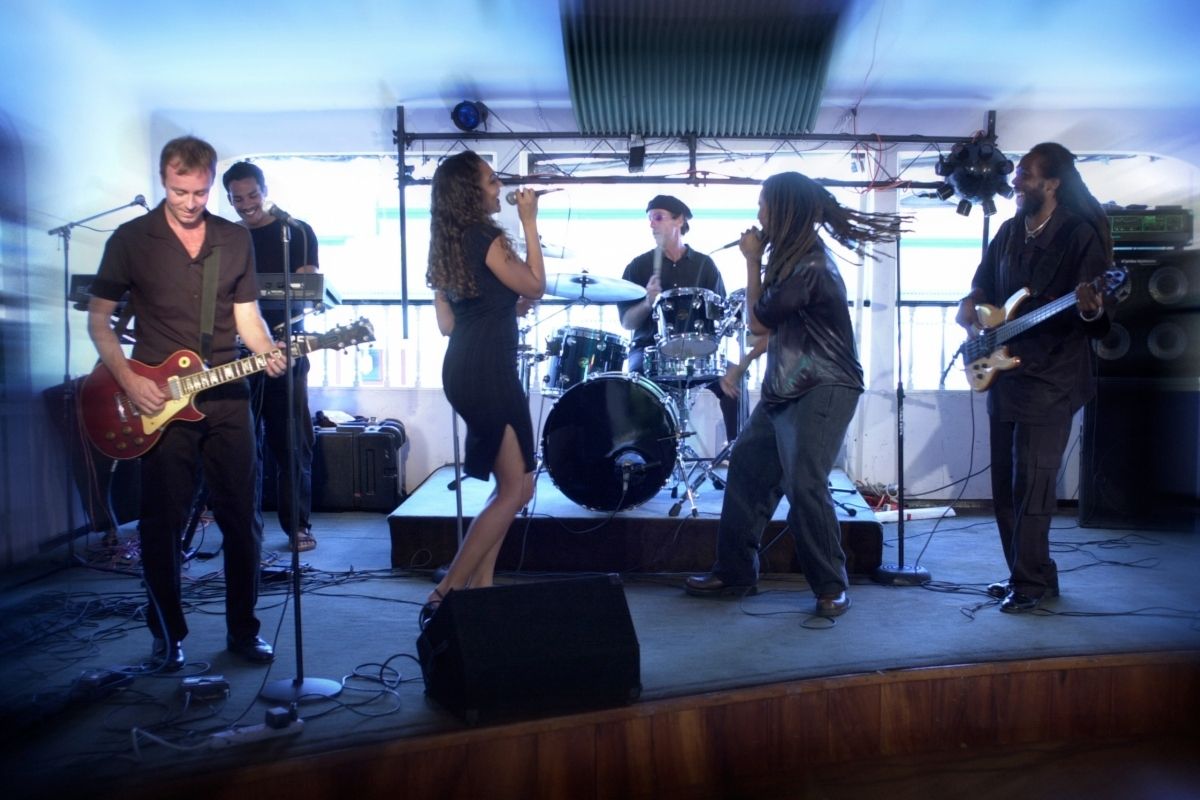I don’t know about you, but a new supergroup wanders into town, I’ve always wondered where its stars are and when and for how long they rehearse. When do they arrive?
If the show is coming to New York from Toronto, do the band members fly in first and wait for the rest of the show to catch up?
Do they hang around in Toronto and do some sightseeing and partying until word comes in that the new venue is ready to receive their genius? Questions!
Right now, the one question that has been bugging the heck out of me is this one: “How long do rock bands and singers rehearse in a new location before a show?”
After exhaustive research (well, okay, after some research), I believe I’ve found the definitive answer.
The typical time that bands rehearse in a new location is about three hours.
Related to: The 5 Best Music Videos Of The Week
Professional musicians and rehearsals
Someone picks up a musical. Oh, dear.

Most professional musicians love what they do. I imagine very few were forced by debt to loan sharks to pick up a musical instrument and strum away because they feared a visit from a strong-arm hoodlum looking to make a somewhat truculent point.
For those of you now thinking to yourselves, “How do you strum on a piano,” haha, very funny. C’mon, you know what I mean.
No, as I was saying, most professional musicians absolutely love their craft. Many picked up a guitar, or sax, a pair of maracas, or whatever and just fell in love with the sounds they elicited from the instrument.
Drummers banged on something and thought, “Boom, this is for me.”
The thing is, everyone and his brother, probably including epoch-defining prodigies like young Wolfgang Amadeus Mozart, probably began their glittering musical careers by hammering out the most horrible cacophony of nerve-shattering screeching sounds imaginable.
In the case of drummers, that reads, “the most horrible cacophony of nerve-shattering, murder-suicide-thoughts inducing, anti-rhythm, Bongo the Chimp banging ever!” (Oh, can you tell I’ve suffered from living next door to a drummer?)
Someone begins to practice their musical instrument. Oh dear, oh, dear.
Someone’s banging on drums!
There are YouTube videos featuring savants banging out interesting and melodic tunes on desks. But for each of these pulsating gurus, there are hundreds of thousands, if not millions and billions, of less gifted desk bashers.
As one wag puts it somewhat rudely:
“What the f**k are you doing? Drumming? No, you aren’t. You’re just slamming your fingers against your desk. Stop it. Stop it forever. No one wants to hear your imaginary drum solos. No one.”
Golding, Ian “Salmon Season”
It’s hard to get away from drum rehearsals, which makes them particularly aggravating. I happen to be one of those poor unfortunates who suffer from misophonia (miso-hatred, phonia-sound).
It is entirely possible to drive me bananas simply by flicking a fingernail or snapping on gum. I mean, I get upset. Really upset.
So much so that if I could get away with it, I’d reach for the old Colt .45 and let the gun do the complaining for me.
Someone’s practicing their “singing”

I’ve got it bad, but I’m still compassionate enough to think of others. The fella who said this, for example:
“My son is in a band, and he’s a singer, and his vocals… they’re screaming-growling stuff… and he’s got a pretty reasonable voice. Yet he practices really hard to get the screaming-growling thing without losing that voice every five minutes. So I’m, like, ‘Hats off to you.’”
Dickinson, B. Retrieved
That’s the love of a father come shining through right there, methinks.
Someone finally nails their instrument
Person and instrument together become a thing of joy to listen to. After hours and hours of practice, and to everyone’s relief, the aficionado finally begins to cobble together pleasing sounds and melodies.
Unless he takes things too far and brings his strumming, fluting, or banging to the breakfast table, at this point, our budding musician is generally welcome in polite society.
10,000 hours of rehearsals and practice

Ignorant optimists often repeat that mastery comes with 10,000 hours of practice. Sour realists like me are acutely aware that this is hogwash.
It is peddled to credulous, morally bankrupt, intellectually lazy souls who believe that there is a sure-fire way to succeed at anything. Nothing could be further from the truth.
In reality, the 10,000 hours claim an obverse statement of a factual one. Just as all men are humans, but not all humans are men, so also all talented people who practice for 10,000 hours gain mastery of their craft.
It is utter nonsense to think that all those who practice for 10,000 hours gain talent and mastery.
Don’t believe me? Go ahead, pick up a chessboard, practice for 10,000, then go beat a grandmaster at chess. Just one thing. Please, before you take that chess challenge, let me sell you one of my New York bridges. Special price!
How do you get to Carnegie Hall?
I’d be surprised if most folks don’t know the answer to the question, “How do you get to Carnegie Hall?” However, just in case, the answer is: “Practice, practice, practice.”
Outside of music, Samuel Goldwin put hard work (and, by extension, practice, and rehearsals) into perspective. In response to someone saying to him, “That was lucky,” Goldwin replied:
“The harder I work, the luckier I get.”
Goldwyn, S. Retrieved
From the world of music, there’s this quote about the great jazz player, Benny Goodwin:
“Benny used to practice 15 times more than the whole band combined.”
Harry James
Those lucky few who fall in love with an instrument and find to their great pleasure that they have a talent for it are more than willing to spend the requisite number of hours making sweet music with their instrument.
Eventually, though, few will resist the urge to find like-minded souls with whom to create collective congenial commixtures of musicality, a rather pompous and unnecessarily verbose way of saying, “form a band.”
Rehearsing in a band
Symphony orchestra rehearsals

Some arty types might take exception when I refer to a full symphony orchestra as ‘a band,’ but take my socks off and see if I care.
The only reason I mention ‘bands’ like the New York Philharmonic is that I want to remark how much practice members of the group have to put in. After all, in a way, each band member has made it to Carnegie Hall.
Classical musicians have to engage in a regular practice that effectively maintains their proficiency with their instruments. I’m speaking here of routines such as etudes, scales, and arpeggios.
After that, they have to put in extra work on the technically demanding parts of whatever piece(s) they will next perform in public.
After that, they have to practice with the rest of the band to ensure that they ‘mesh’ cohesively with the entire group and play their part seamlessly.
However, perhaps due to the rigorous technicality of this kind of music, classical musicians are mostly able to arrive at a new venue and, with very little rehearsal, get set up and ready to go.
New venues, it turns out, don’t really faze classical musicians.
Jazz group rehearsals
Jazz musicians have an entirely different mindset from classical music artists.
The jazz musician must be outstandingly proficient with this instrument, but how he fits into the often-extemporized group dynamic will ultimately make him a worthy asset or unfit burden to the band.
Jazz musicians, therefore, schedule practice far more often than other types of groups.
Yet, by dint of having to ply their trade in different venues to mostly smaller crowds than other kinds of musicians, jazz players know how to show up and give a virtuoso performance at the drop of a hat.
It might take a few minutes to get the hang of the acoustics in the new place, but sooner than with other types of bands, a jazz group will be able to get going seemingly at the drop of a hat.
Pop group rehearsals

Pop groups are–in some cases, literally–the hippies of the music world. Their freewheeling, anything goes, “this is how I like it” attitude is reflected in the vast array of rehearsal schedules followed by different bands.
Some groups treat rehearsals the same way soldiers treat morning fatigues. There’s a time and place for everything, but it’s all business when it comes down to rehearsing. Their rule is to show up on time, sober, and ready to go.
Other bands have a more laissez-faire attitude. Big egos and big pockets may adversely affect the willingness of some band members to show up ready, willing, and able to go, much to the frustration of fellow bandmates and even fans.
One-man band acts, of course, have no one else but themselves to blame, yet these individuals, too, can show up unrehearsed to assault their audience with missed notes, out-of-tune screeching, and mistimed entries.
In effect, rehearsals are a jungle mishmash of play it by ear in the pop world, and there isn’t just one way to do things.
That said, it really does seem that the most successful bands will spend about three hours tuning up and ensuring that they can deliver the best experience they can muster to their adoring fans.




